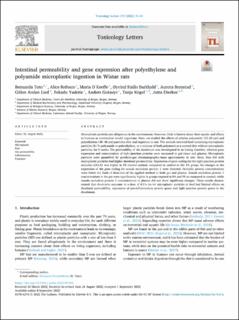| dc.contributor.author | Toto, Benuarda | |
| dc.contributor.author | Refosco, Alice | |
| dc.contributor.author | O'Keeffe, Maria | |
| dc.contributor.author | Barkhald, Øyvind Halås | |
| dc.contributor.author | Brønstad, Aurora Margrethe | |
| dc.contributor.author | Lied, Gülen Arslan | |
| dc.contributor.author | Yadetie, Fekadu | |
| dc.contributor.author | Goksøyr, Anders | |
| dc.contributor.author | Kögel, Tanja | |
| dc.contributor.author | Dierkes, Jutta | |
| dc.date.accessioned | 2022-10-25T13:44:10Z | |
| dc.date.available | 2022-10-25T13:44:10Z | |
| dc.date.created | 2022-10-07T19:34:30Z | |
| dc.date.issued | 2022 | |
| dc.identifier.issn | 0378-4274 | |
| dc.identifier.uri | https://hdl.handle.net/11250/3028232 | |
| dc.description.abstract | Microplastic particles are ubiquitous in the environment. However, little is known about their uptake and effects in humans or mammalian model organisms. Here, we studied the effects of pristine polyamide (15–20 µm) and polyethylene (40–48 µm) particles after oral ingestion in rats. The animals received feed containing microplastic particles (0.1% polyamide or polyethylene, or a mixture of both polymers) or a control diet without microplastic particles, for 5 weeks. The permeability of the duodenum was investigated in an Ussing chamber, whereas gene expression and concentration of tight junction proteins were measured in gut tissue and plasma. Microplastic particles were quantified by pyrolysis-gas chromatography/mass spectrometry in rats’ feces. Rats fed with microplastic particles had higher duodenal permeability. Expression of gene coding for the tight junction protein occludin (OCLN) was higher in PE treated animals compared to control or the PA group. No changes in the expression of the gene coding for zonula occludens protein 1 were detected. Occludin protein concentrations were below the limit of detection of the applied method in both gut and plasma. Zonula occludens protein 1 concentrations in the gut were significantly higher in groups exposed to PA and PE as compared to control, while zonula occludens protein 1 concentrations in plasma did not show significant changes. These results demonstrated that short-term exposure to a dose of 0.1% (w/w) microplastic particles in feed had limited effects on duodenal permeability, expression of pro-inflammatory protein genes and tight junction protein genes in the duodenum. | en_US |
| dc.language.iso | eng | en_US |
| dc.publisher | Elsevier | en_US |
| dc.rights | Navngivelse 4.0 Internasjonal | * |
| dc.rights.uri | http://creativecommons.org/licenses/by/4.0/deed.no | * |
| dc.title | Intestinal permeability and gene expression after polyethylene and polyamide microplastic ingestion in Wistar rats | en_US |
| dc.type | Journal article | en_US |
| dc.type | Peer reviewed | en_US |
| dc.description.version | publishedVersion | en_US |
| dc.rights.holder | Copyright 2022 the authors | en_US |
| cristin.ispublished | true | |
| cristin.fulltext | original | |
| cristin.qualitycode | 1 | |
| dc.identifier.doi | 10.1016/j.toxlet.2022.09.002 | |
| dc.identifier.cristin | 2059726 | |
| dc.source.journal | Toxicology Letters | en_US |
| dc.source.pagenumber | 35-41 | en_US |
| dc.identifier.citation | Toxicology Letters. 2022, 370, 35-41. | en_US |
| dc.source.volume | 370 | en_US |

